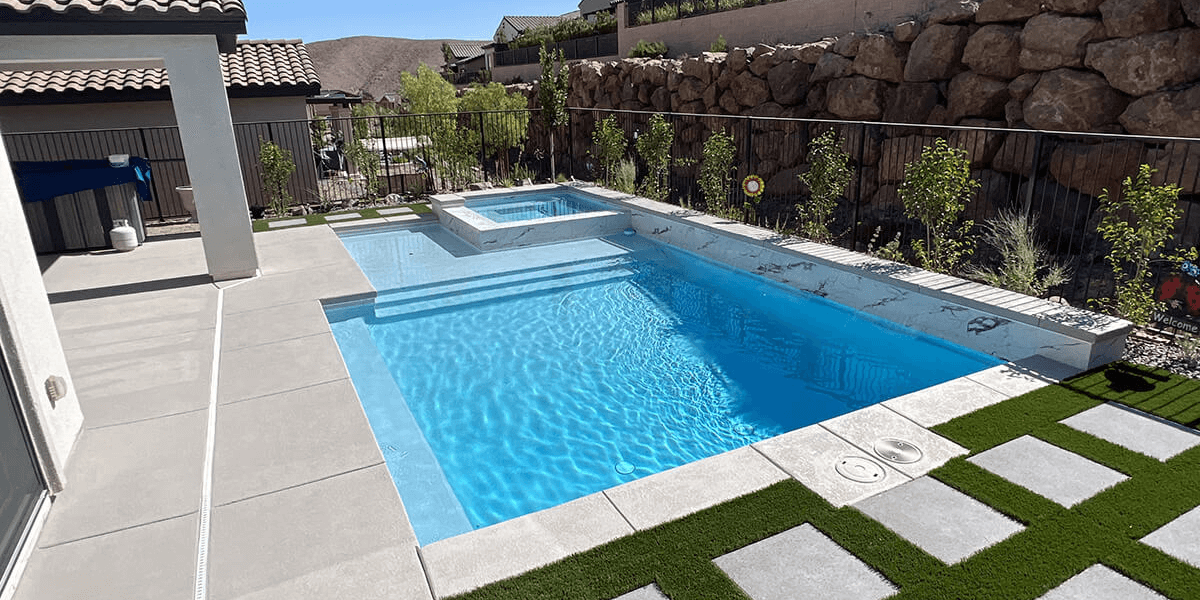Considering a new pool for your home? You might have heard about gunite swimming pools, but what exactly are they, and how do they stack up in terms of pool construction and cost compared to other options? In this article, we’ll break down the ins and outs of gunite pools, exploring their construction, installation, and price. We’ll also delve into the perks they bring and touch on the upkeep needed in terms of pool maintenance to keep them in top shape.
What is a Gunite Pool?
A gunite pool is essentially an in-ground swimming pool crafted using a mix of concrete and sand applied with pneumatic force. This mixture is sprayed onto a steel rebar framework, creating a sturdy structure built to last. People often opt for gunite pools due to their robustness, making them a popular choice for those seeking a reliable pool design for the long haul.
These pools have been around for a while, thanks to their adaptability and customizability. Unlike fiberglass or vinyl liner pools, gunite pools boast flexibility in both shape and size. Whether your yard is small and oddly shaped or spacious and open, a gunite pool can be tailored to make the most of the available space, fitting perfectly into your swimming pool plans.
The flexibility extends to features and accessories too. Waterfalls, fountains, and jets can be seamlessly integrated to not only elevate the pool’s aesthetics but also enhance its functionality. Advanced tech like automated cleaning systems, heating setups, and lighting options can be woven into the design for an even more elevated swimming experience.
How’s a Gunite Pool Built?
Gunite pool construction involves a unique blend of craftsmanship and technology.
Excavation and layout
It kicks off with meticulous planning and excavation of the designated pool area, requiring precision to ensure proper alignment with the surrounding landscape.
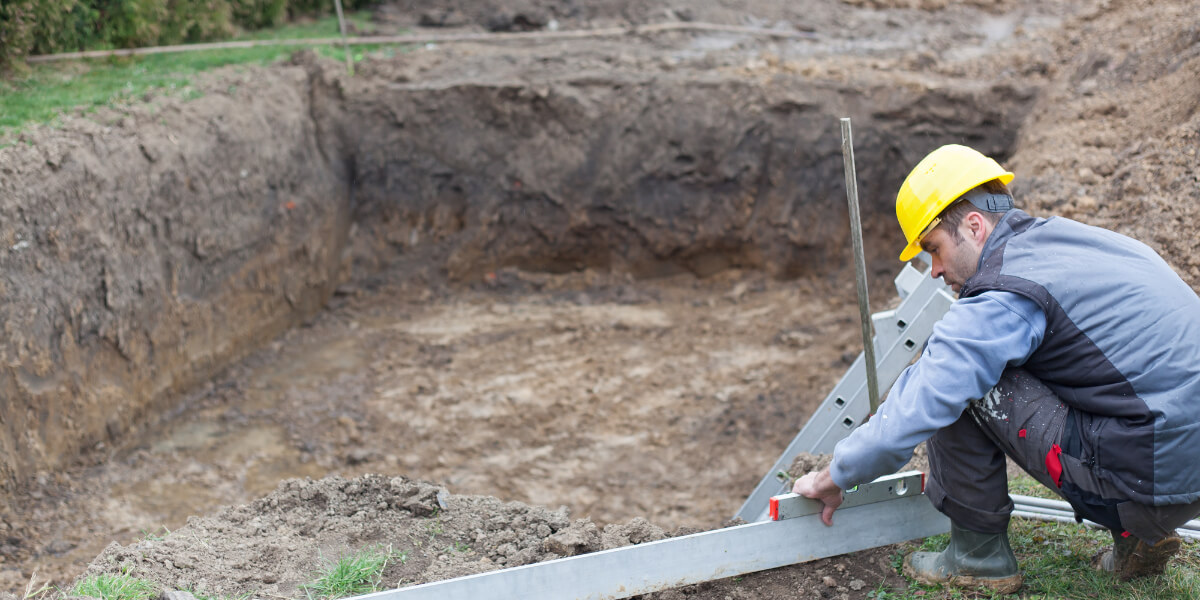
Steel reinforcement
Once the excavation is complete, a strong steel framework called rebar is installed to provide structural support. The rebar is meticulously placed in a grid pattern, creating a sturdy skeleton for the pool. This step is crucial as it ensures the pool’s strength and durability, allowing it to withstand the test of time.
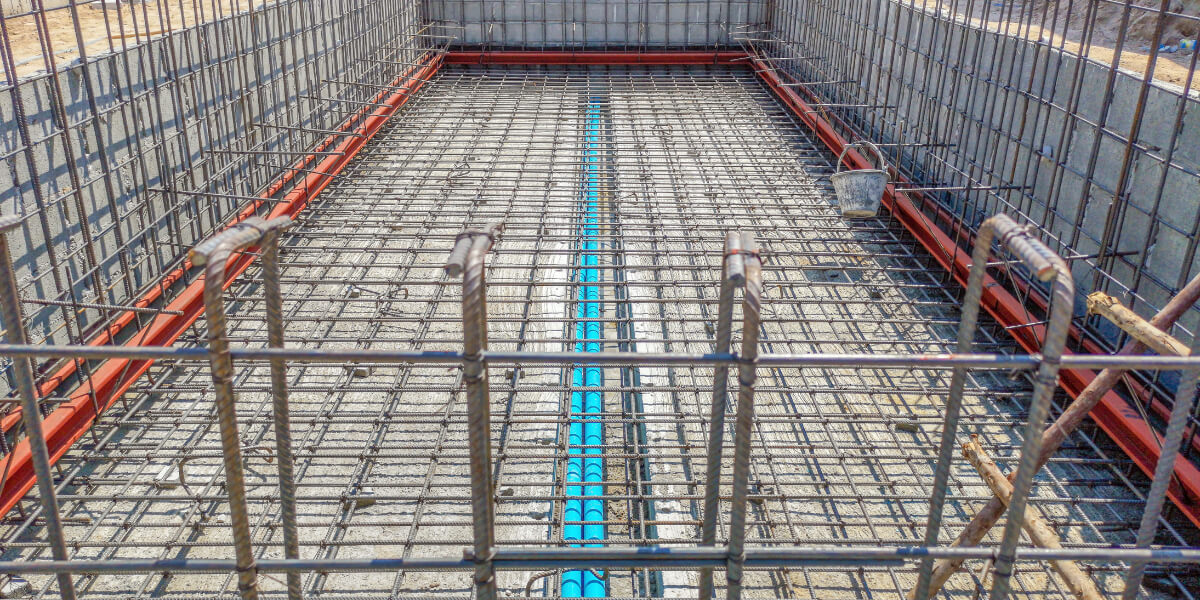
Application of Gunite
After the rebar is in place, a layer of gunite is applied to create the pool’s shell. Gunite is a mixture of sand, cement, and water that is sprayed onto the rebar framework using a high-pressure hose. Skilled technicians carefully manipulate the gunite during this application process to shape the pool according to the desired design.
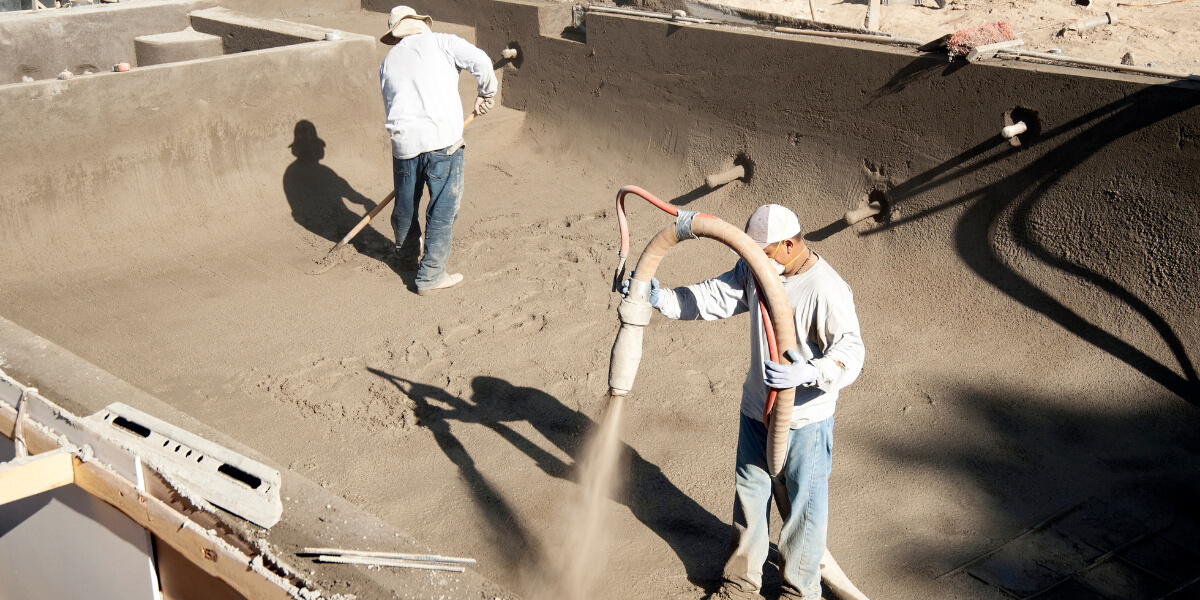
How long does gunite take to cure?
After gunite application, the pool undergoes a curing process, lasting several weeks. This involves keeping the pool moist and allowing the gunite to harden and gain its full strength.
After the gunite has fully cured, the pool’s interior finish is applied. The choice of finish may vary depending on preference, ranging from plaster to tile finishes. The interior finish not only enhances the pool’s appearance but also provides a smooth and comfortable surface for swimmers.
As the final step, the pool is filled with water and the necessary equipment, such as pumps, filters, and heaters, is installed.
Each step involved in constructing a gunite swimming pool is important. Starting from excavating and setting up the framework, to applying gunite and adding those final touches, every single stage plays a role in crafting a long-lasting and functional swimming pool.
How long does it take to build a gunite swimming pool?
Building a gunite pool’s duration varies based on factors like size, design complexity, and weather conditions. On average, it takes around 6 to 12 weeks. It’s important to note that this timeline includes not only constructing the pool shell, but also installing features like decking, landscaping elements, and equipment.
Distinction from Other Pool Types
What sets gunite pools apart from others like vinyl or fiberglass? The key difference lies in the construction method. Gunite pools are crafted on-site, allowing for limitless design possibilities. In contrast, vinyl and fiberglass pools come prefabricated in predetermined shapes and sizes.
Additionally, gunite pools have a longer lifespan compared to other types of pools. Their durability and ability to be repaired and remodeled make them a favored choice among homeowners looking for a long-term investment.
Gunite pools also offer versatility when it comes to adding features such as waterfalls, spas, or tanning ledges. These additional features can enhance your pool experience and create a luxurious outdoor oasis.
Drawbacks and Considerations
Along with the advantages, there are also some considerations that you should take into account. Construction costs for gunite pools tend to be higher due to their custom nature and labor-intensive process.
Another factor worth considering is the swimming pool maintenance and care. Regular upkeep such as cleaning, maintaining water chemistry balance, and inspecting for any cracks or structural issues is vital for ensuring the pool’s longevity and optimal performance.
What Does a Gunite Pool Cost?
The cost of a gunite pool varies based on features and size. On average, you’re looking at $50,000 to $100,000 or more. It is crucial to consider not only the construction expenses but also the ongoing costs. You need to factor in maintenance, water, and energy bills, as well as potential repairs.
Care and Maintenance
To keep your gunite pool in top condition, regular cleaning, monitoring chemical levels, and equipment inspections are a must. Professional inspections are recommended periodically to catch and address potential issues before they escalate.
By following a maintenance routine and taking preventative measures, you can ensure that your gunite pool continues to be a source of enjoyment for many years to come.
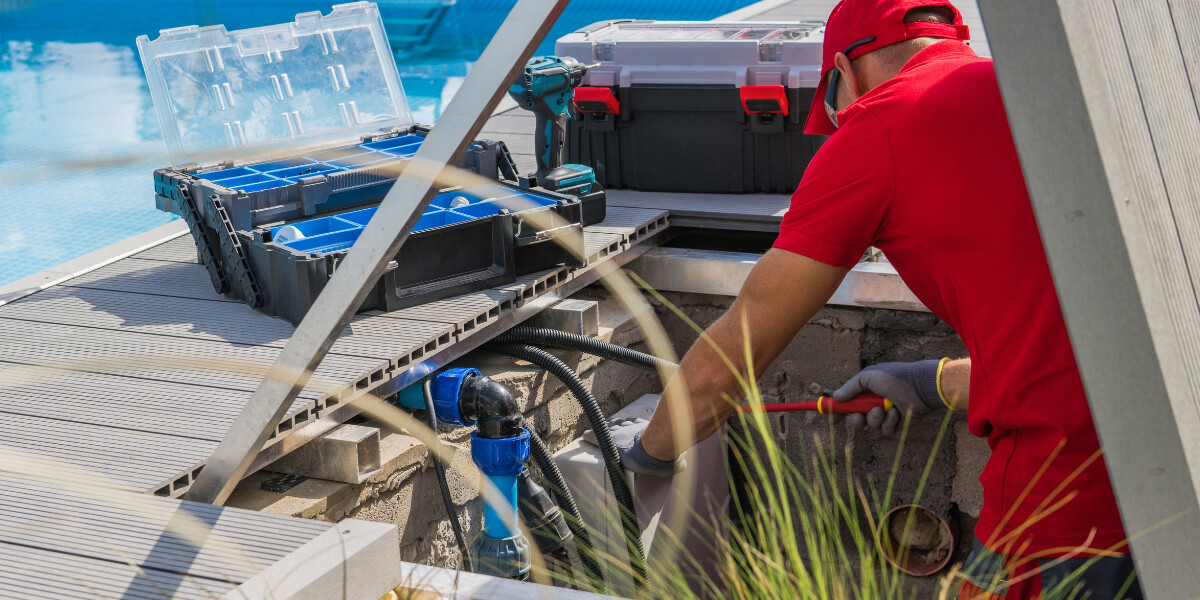
For more information on gunite swimming pools or to discuss your own pool design and swimming pool plans, do not hesitate to contact our professionals.
In conclusion, a gunite pool offers versatility and durability with endless design possibilities. The construction process is intricate but allows for customization and ensures a solid structure. When considering the cost, think not just about the initial investment but also the long-term expenses. With proper care, a gunite pool can be a source of enjoyment for years to come.
Gunite pools merge concrete and sand through pneumatic force, creating an in-ground oasis known for resilience. Distinguishing themselves from prefab alternatives, gunite pools beckon with added features like waterfalls and spas, making them a premium investment, albeit with higher initial costs, necessitating vigilant maintenance for lasting enjoyment.
Beyond the conventional, they serve as canvases for personalized luxury — integrating not just water features but also smart tech seamlessly. Imagine a pool that not only refreshes but also adapts to your preferences, making every dip an immersive experience. This fusion of functionality and artistry elevates the idea of a swimming pool, turning it into a dynamic and customizable space for relaxation and recreation.

